The Health Advantages of a High Protein Diet: An Essay
VerifiedAdded on 2022/10/11
|7
|1878
|8
Essay
AI Summary
This essay delves into the health benefits of a high-protein diet, examining its impact on various aspects of well-being. The paper begins by emphasizing the essential role of proteins in bodily functions, including energy production, muscle building, and immune system support. It highlights research suggesting that high-protein diets can aid in fat loss while preserving lean muscle mass, increasing satiety, and boosting metabolic rate. The essay reviews two primary studies: 'Dietary protein–its role in satiety, energetics, weight loss, and health' and 'Metabolic advantages of higher protein diets and benefits of dairy foods on weight management, glycemic regulation, and bone.' The essay explains how high-protein diets, composed of foods like lean meats, poultry, and eggs, contribute to greater satiety, improve metabolism, and support muscle development. It also discusses the role of protein in sleep quality, fat loss, strengthening connective tissues, and maintaining health in older adults. The conclusion reinforces the importance of protein for overall health, weight management, and muscle building, in conjunction with physical activity.
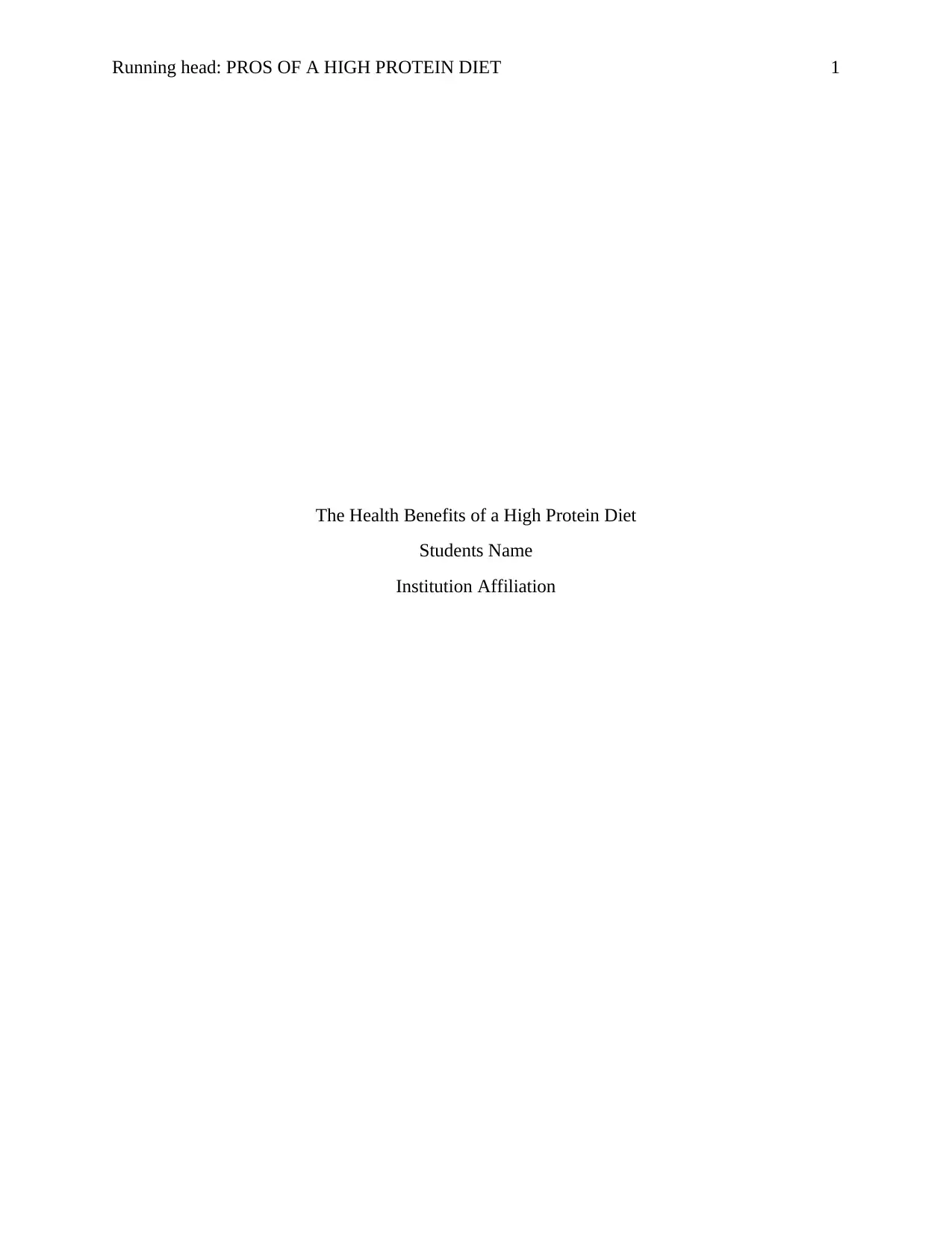
Running head: PROS OF A HIGH PROTEIN DIET 1
The Health Benefits of a High Protein Diet
Students Name
Institution Affiliation
The Health Benefits of a High Protein Diet
Students Name
Institution Affiliation
Paraphrase This Document
Need a fresh take? Get an instant paraphrase of this document with our AI Paraphraser
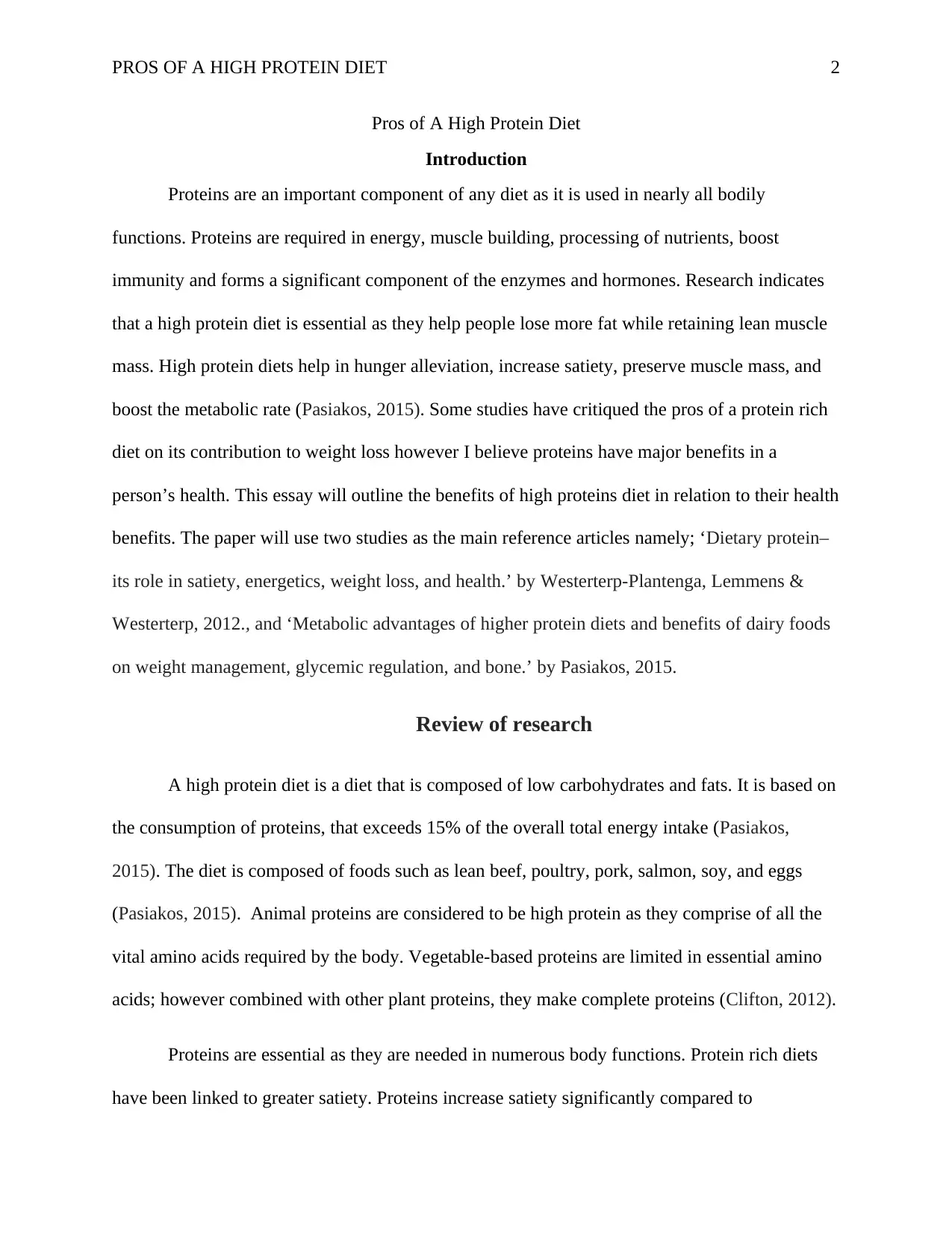
PROS OF A HIGH PROTEIN DIET 2
Pros of A High Protein Diet
Introduction
Proteins are an important component of any diet as it is used in nearly all bodily
functions. Proteins are required in energy, muscle building, processing of nutrients, boost
immunity and forms a significant component of the enzymes and hormones. Research indicates
that a high protein diet is essential as they help people lose more fat while retaining lean muscle
mass. High protein diets help in hunger alleviation, increase satiety, preserve muscle mass, and
boost the metabolic rate (Pasiakos, 2015). Some studies have critiqued the pros of a protein rich
diet on its contribution to weight loss however I believe proteins have major benefits in a
person’s health. This essay will outline the benefits of high proteins diet in relation to their health
benefits. The paper will use two studies as the main reference articles namely; ‘Dietary protein–
its role in satiety, energetics, weight loss, and health.’ by Westerterp-Plantenga, Lemmens &
Westerterp, 2012., and ‘Metabolic advantages of higher protein diets and benefits of dairy foods
on weight management, glycemic regulation, and bone.’ by Pasiakos, 2015.
Review of research
A high protein diet is a diet that is composed of low carbohydrates and fats. It is based on
the consumption of proteins, that exceeds 15% of the overall total energy intake (Pasiakos,
2015). The diet is composed of foods such as lean beef, poultry, pork, salmon, soy, and eggs
(Pasiakos, 2015). Animal proteins are considered to be high protein as they comprise of all the
vital amino acids required by the body. Vegetable-based proteins are limited in essential amino
acids; however combined with other plant proteins, they make complete proteins (Clifton, 2012).
Proteins are essential as they are needed in numerous body functions. Protein rich diets
have been linked to greater satiety. Proteins increase satiety significantly compared to
Pros of A High Protein Diet
Introduction
Proteins are an important component of any diet as it is used in nearly all bodily
functions. Proteins are required in energy, muscle building, processing of nutrients, boost
immunity and forms a significant component of the enzymes and hormones. Research indicates
that a high protein diet is essential as they help people lose more fat while retaining lean muscle
mass. High protein diets help in hunger alleviation, increase satiety, preserve muscle mass, and
boost the metabolic rate (Pasiakos, 2015). Some studies have critiqued the pros of a protein rich
diet on its contribution to weight loss however I believe proteins have major benefits in a
person’s health. This essay will outline the benefits of high proteins diet in relation to their health
benefits. The paper will use two studies as the main reference articles namely; ‘Dietary protein–
its role in satiety, energetics, weight loss, and health.’ by Westerterp-Plantenga, Lemmens &
Westerterp, 2012., and ‘Metabolic advantages of higher protein diets and benefits of dairy foods
on weight management, glycemic regulation, and bone.’ by Pasiakos, 2015.
Review of research
A high protein diet is a diet that is composed of low carbohydrates and fats. It is based on
the consumption of proteins, that exceeds 15% of the overall total energy intake (Pasiakos,
2015). The diet is composed of foods such as lean beef, poultry, pork, salmon, soy, and eggs
(Pasiakos, 2015). Animal proteins are considered to be high protein as they comprise of all the
vital amino acids required by the body. Vegetable-based proteins are limited in essential amino
acids; however combined with other plant proteins, they make complete proteins (Clifton, 2012).
Proteins are essential as they are needed in numerous body functions. Protein rich diets
have been linked to greater satiety. Proteins increase satiety significantly compared to
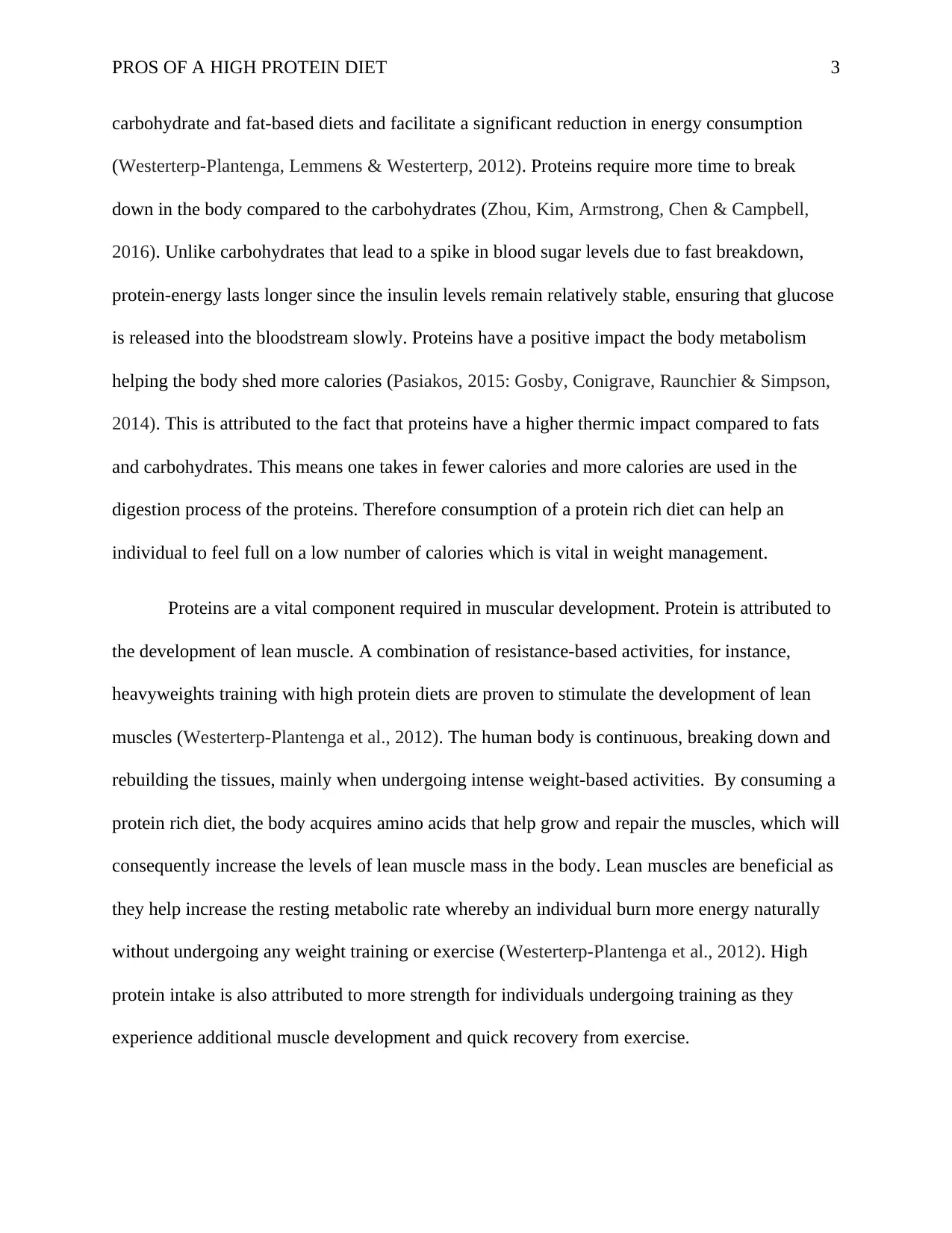
PROS OF A HIGH PROTEIN DIET 3
carbohydrate and fat-based diets and facilitate a significant reduction in energy consumption
(Westerterp-Plantenga, Lemmens & Westerterp, 2012). Proteins require more time to break
down in the body compared to the carbohydrates (Zhou, Kim, Armstrong, Chen & Campbell,
2016). Unlike carbohydrates that lead to a spike in blood sugar levels due to fast breakdown,
protein-energy lasts longer since the insulin levels remain relatively stable, ensuring that glucose
is released into the bloodstream slowly. Proteins have a positive impact the body metabolism
helping the body shed more calories (Pasiakos, 2015: Gosby, Conigrave, Raunchier & Simpson,
2014). This is attributed to the fact that proteins have a higher thermic impact compared to fats
and carbohydrates. This means one takes in fewer calories and more calories are used in the
digestion process of the proteins. Therefore consumption of a protein rich diet can help an
individual to feel full on a low number of calories which is vital in weight management.
Proteins are a vital component required in muscular development. Protein is attributed to
the development of lean muscle. A combination of resistance-based activities, for instance,
heavyweights training with high protein diets are proven to stimulate the development of lean
muscles (Westerterp-Plantenga et al., 2012). The human body is continuous, breaking down and
rebuilding the tissues, mainly when undergoing intense weight-based activities. By consuming a
protein rich diet, the body acquires amino acids that help grow and repair the muscles, which will
consequently increase the levels of lean muscle mass in the body. Lean muscles are beneficial as
they help increase the resting metabolic rate whereby an individual burn more energy naturally
without undergoing any weight training or exercise (Westerterp-Plantenga et al., 2012). High
protein intake is also attributed to more strength for individuals undergoing training as they
experience additional muscle development and quick recovery from exercise.
carbohydrate and fat-based diets and facilitate a significant reduction in energy consumption
(Westerterp-Plantenga, Lemmens & Westerterp, 2012). Proteins require more time to break
down in the body compared to the carbohydrates (Zhou, Kim, Armstrong, Chen & Campbell,
2016). Unlike carbohydrates that lead to a spike in blood sugar levels due to fast breakdown,
protein-energy lasts longer since the insulin levels remain relatively stable, ensuring that glucose
is released into the bloodstream slowly. Proteins have a positive impact the body metabolism
helping the body shed more calories (Pasiakos, 2015: Gosby, Conigrave, Raunchier & Simpson,
2014). This is attributed to the fact that proteins have a higher thermic impact compared to fats
and carbohydrates. This means one takes in fewer calories and more calories are used in the
digestion process of the proteins. Therefore consumption of a protein rich diet can help an
individual to feel full on a low number of calories which is vital in weight management.
Proteins are a vital component required in muscular development. Protein is attributed to
the development of lean muscle. A combination of resistance-based activities, for instance,
heavyweights training with high protein diets are proven to stimulate the development of lean
muscles (Westerterp-Plantenga et al., 2012). The human body is continuous, breaking down and
rebuilding the tissues, mainly when undergoing intense weight-based activities. By consuming a
protein rich diet, the body acquires amino acids that help grow and repair the muscles, which will
consequently increase the levels of lean muscle mass in the body. Lean muscles are beneficial as
they help increase the resting metabolic rate whereby an individual burn more energy naturally
without undergoing any weight training or exercise (Westerterp-Plantenga et al., 2012). High
protein intake is also attributed to more strength for individuals undergoing training as they
experience additional muscle development and quick recovery from exercise.
⊘ This is a preview!⊘
Do you want full access?
Subscribe today to unlock all pages.

Trusted by 1+ million students worldwide
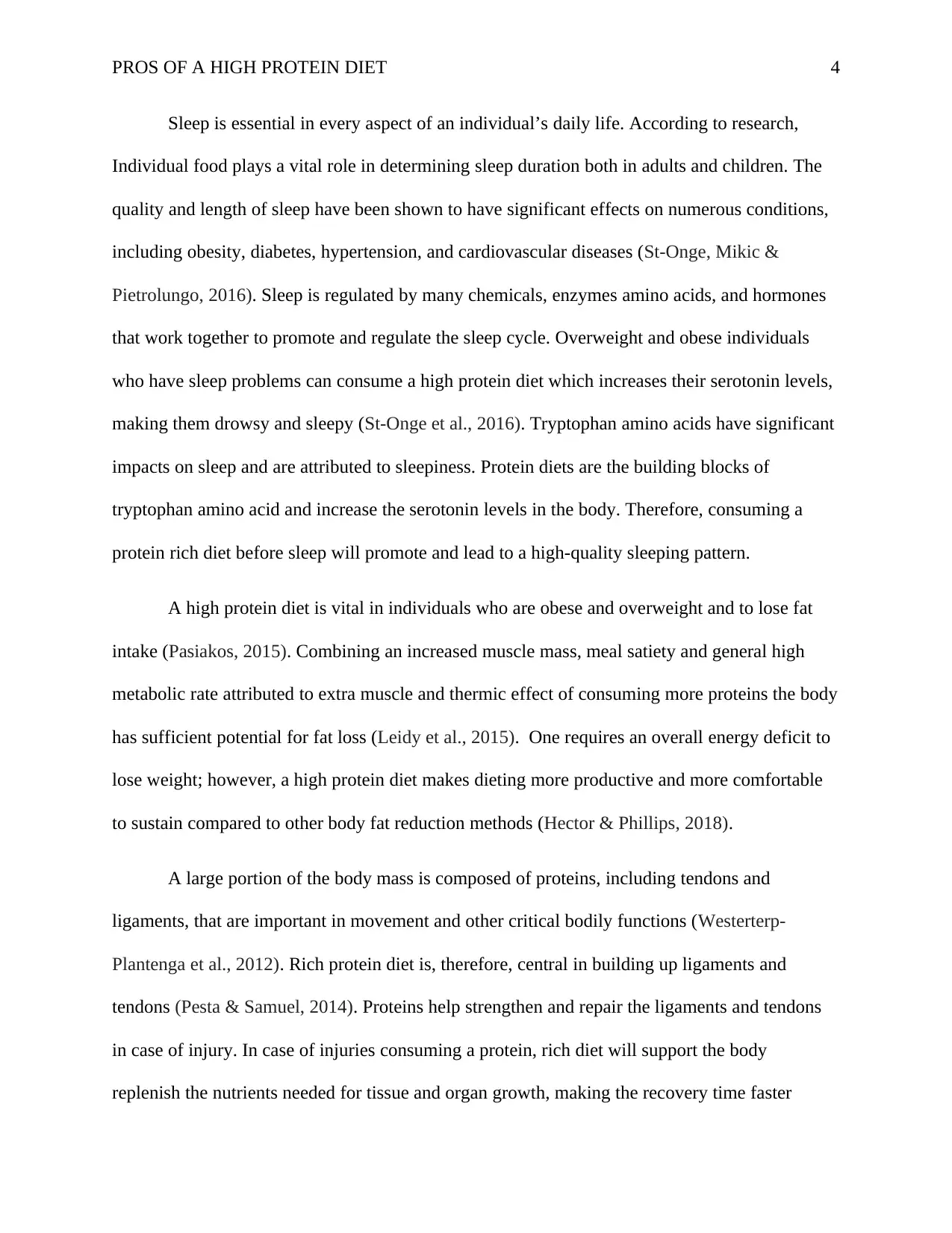
PROS OF A HIGH PROTEIN DIET 4
Sleep is essential in every aspect of an individual’s daily life. According to research,
Individual food plays a vital role in determining sleep duration both in adults and children. The
quality and length of sleep have been shown to have significant effects on numerous conditions,
including obesity, diabetes, hypertension, and cardiovascular diseases (St-Onge, Mikic &
Pietrolungo, 2016). Sleep is regulated by many chemicals, enzymes amino acids, and hormones
that work together to promote and regulate the sleep cycle. Overweight and obese individuals
who have sleep problems can consume a high protein diet which increases their serotonin levels,
making them drowsy and sleepy (St-Onge et al., 2016). Tryptophan amino acids have significant
impacts on sleep and are attributed to sleepiness. Protein diets are the building blocks of
tryptophan amino acid and increase the serotonin levels in the body. Therefore, consuming a
protein rich diet before sleep will promote and lead to a high-quality sleeping pattern.
A high protein diet is vital in individuals who are obese and overweight and to lose fat
intake (Pasiakos, 2015). Combining an increased muscle mass, meal satiety and general high
metabolic rate attributed to extra muscle and thermic effect of consuming more proteins the body
has sufficient potential for fat loss (Leidy et al., 2015). One requires an overall energy deficit to
lose weight; however, a high protein diet makes dieting more productive and more comfortable
to sustain compared to other body fat reduction methods (Hector & Phillips, 2018).
A large portion of the body mass is composed of proteins, including tendons and
ligaments, that are important in movement and other critical bodily functions (Westerterp-
Plantenga et al., 2012). Rich protein diet is, therefore, central in building up ligaments and
tendons (Pesta & Samuel, 2014). Proteins help strengthen and repair the ligaments and tendons
in case of injury. In case of injuries consuming a protein, rich diet will support the body
replenish the nutrients needed for tissue and organ growth, making the recovery time faster
Sleep is essential in every aspect of an individual’s daily life. According to research,
Individual food plays a vital role in determining sleep duration both in adults and children. The
quality and length of sleep have been shown to have significant effects on numerous conditions,
including obesity, diabetes, hypertension, and cardiovascular diseases (St-Onge, Mikic &
Pietrolungo, 2016). Sleep is regulated by many chemicals, enzymes amino acids, and hormones
that work together to promote and regulate the sleep cycle. Overweight and obese individuals
who have sleep problems can consume a high protein diet which increases their serotonin levels,
making them drowsy and sleepy (St-Onge et al., 2016). Tryptophan amino acids have significant
impacts on sleep and are attributed to sleepiness. Protein diets are the building blocks of
tryptophan amino acid and increase the serotonin levels in the body. Therefore, consuming a
protein rich diet before sleep will promote and lead to a high-quality sleeping pattern.
A high protein diet is vital in individuals who are obese and overweight and to lose fat
intake (Pasiakos, 2015). Combining an increased muscle mass, meal satiety and general high
metabolic rate attributed to extra muscle and thermic effect of consuming more proteins the body
has sufficient potential for fat loss (Leidy et al., 2015). One requires an overall energy deficit to
lose weight; however, a high protein diet makes dieting more productive and more comfortable
to sustain compared to other body fat reduction methods (Hector & Phillips, 2018).
A large portion of the body mass is composed of proteins, including tendons and
ligaments, that are important in movement and other critical bodily functions (Westerterp-
Plantenga et al., 2012). Rich protein diet is, therefore, central in building up ligaments and
tendons (Pesta & Samuel, 2014). Proteins help strengthen and repair the ligaments and tendons
in case of injury. In case of injuries consuming a protein, rich diet will support the body
replenish the nutrients needed for tissue and organ growth, making the recovery time faster
Paraphrase This Document
Need a fresh take? Get an instant paraphrase of this document with our AI Paraphraser
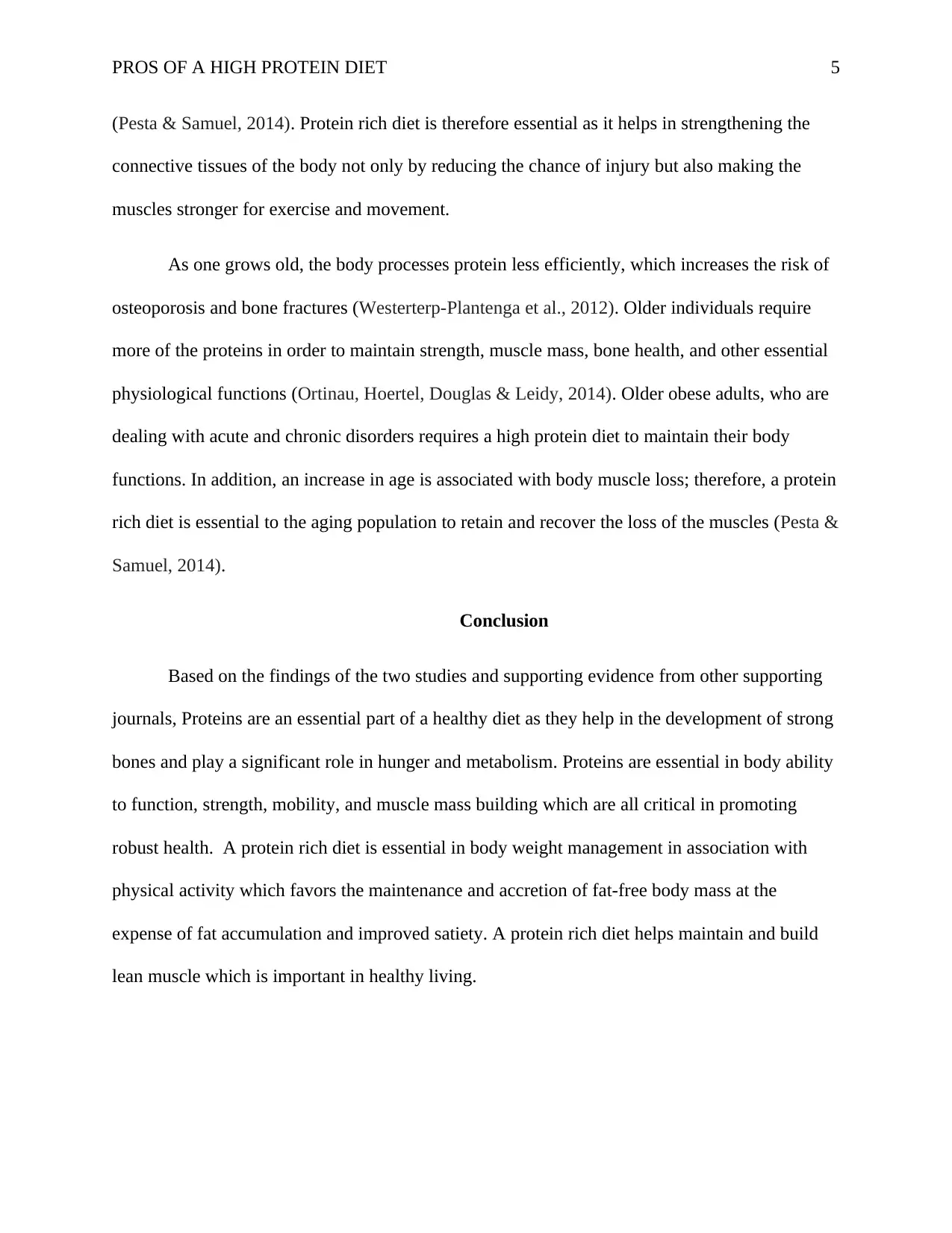
PROS OF A HIGH PROTEIN DIET 5
(Pesta & Samuel, 2014). Protein rich diet is therefore essential as it helps in strengthening the
connective tissues of the body not only by reducing the chance of injury but also making the
muscles stronger for exercise and movement.
As one grows old, the body processes protein less efficiently, which increases the risk of
osteoporosis and bone fractures (Westerterp-Plantenga et al., 2012). Older individuals require
more of the proteins in order to maintain strength, muscle mass, bone health, and other essential
physiological functions (Ortinau, Hoertel, Douglas & Leidy, 2014). Older obese adults, who are
dealing with acute and chronic disorders requires a high protein diet to maintain their body
functions. In addition, an increase in age is associated with body muscle loss; therefore, a protein
rich diet is essential to the aging population to retain and recover the loss of the muscles (Pesta &
Samuel, 2014).
Conclusion
Based on the findings of the two studies and supporting evidence from other supporting
journals, Proteins are an essential part of a healthy diet as they help in the development of strong
bones and play a significant role in hunger and metabolism. Proteins are essential in body ability
to function, strength, mobility, and muscle mass building which are all critical in promoting
robust health. A protein rich diet is essential in body weight management in association with
physical activity which favors the maintenance and accretion of fat-free body mass at the
expense of fat accumulation and improved satiety. A protein rich diet helps maintain and build
lean muscle which is important in healthy living.
(Pesta & Samuel, 2014). Protein rich diet is therefore essential as it helps in strengthening the
connective tissues of the body not only by reducing the chance of injury but also making the
muscles stronger for exercise and movement.
As one grows old, the body processes protein less efficiently, which increases the risk of
osteoporosis and bone fractures (Westerterp-Plantenga et al., 2012). Older individuals require
more of the proteins in order to maintain strength, muscle mass, bone health, and other essential
physiological functions (Ortinau, Hoertel, Douglas & Leidy, 2014). Older obese adults, who are
dealing with acute and chronic disorders requires a high protein diet to maintain their body
functions. In addition, an increase in age is associated with body muscle loss; therefore, a protein
rich diet is essential to the aging population to retain and recover the loss of the muscles (Pesta &
Samuel, 2014).
Conclusion
Based on the findings of the two studies and supporting evidence from other supporting
journals, Proteins are an essential part of a healthy diet as they help in the development of strong
bones and play a significant role in hunger and metabolism. Proteins are essential in body ability
to function, strength, mobility, and muscle mass building which are all critical in promoting
robust health. A protein rich diet is essential in body weight management in association with
physical activity which favors the maintenance and accretion of fat-free body mass at the
expense of fat accumulation and improved satiety. A protein rich diet helps maintain and build
lean muscle which is important in healthy living.
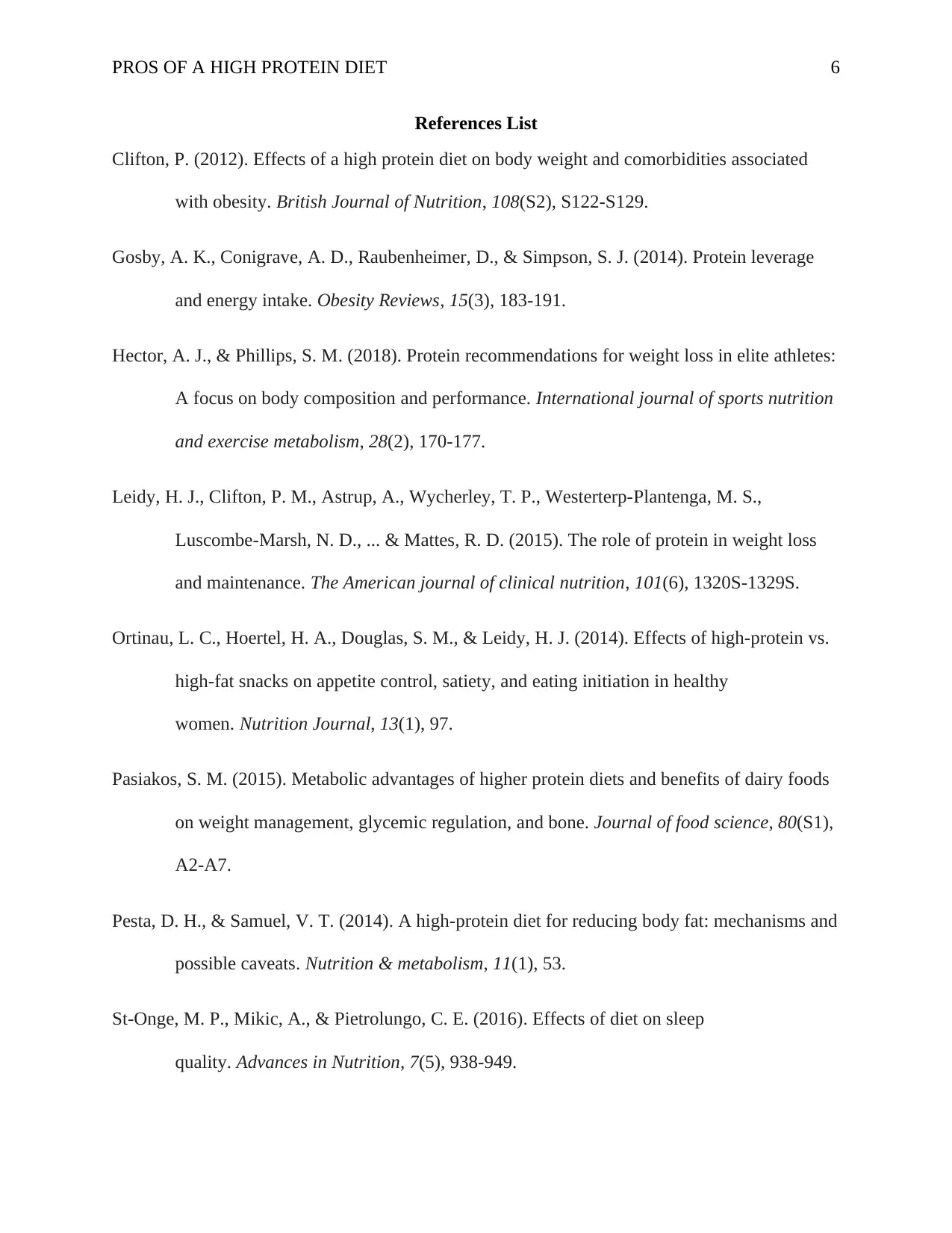
PROS OF A HIGH PROTEIN DIET 6
References List
Clifton, P. (2012). Effects of a high protein diet on body weight and comorbidities associated
with obesity. British Journal of Nutrition, 108(S2), S122-S129.
Gosby, A. K., Conigrave, A. D., Raubenheimer, D., & Simpson, S. J. (2014). Protein leverage
and energy intake. Obesity Reviews, 15(3), 183-191.
Hector, A. J., & Phillips, S. M. (2018). Protein recommendations for weight loss in elite athletes:
A focus on body composition and performance. International journal of sports nutrition
and exercise metabolism, 28(2), 170-177.
Leidy, H. J., Clifton, P. M., Astrup, A., Wycherley, T. P., Westerterp-Plantenga, M. S.,
Luscombe-Marsh, N. D., ... & Mattes, R. D. (2015). The role of protein in weight loss
and maintenance. The American journal of clinical nutrition, 101(6), 1320S-1329S.
Ortinau, L. C., Hoertel, H. A., Douglas, S. M., & Leidy, H. J. (2014). Effects of high-protein vs.
high-fat snacks on appetite control, satiety, and eating initiation in healthy
women. Nutrition Journal, 13(1), 97.
Pasiakos, S. M. (2015). Metabolic advantages of higher protein diets and benefits of dairy foods
on weight management, glycemic regulation, and bone. Journal of food science, 80(S1),
A2-A7.
Pesta, D. H., & Samuel, V. T. (2014). A high-protein diet for reducing body fat: mechanisms and
possible caveats. Nutrition & metabolism, 11(1), 53.
St-Onge, M. P., Mikic, A., & Pietrolungo, C. E. (2016). Effects of diet on sleep
quality. Advances in Nutrition, 7(5), 938-949.
References List
Clifton, P. (2012). Effects of a high protein diet on body weight and comorbidities associated
with obesity. British Journal of Nutrition, 108(S2), S122-S129.
Gosby, A. K., Conigrave, A. D., Raubenheimer, D., & Simpson, S. J. (2014). Protein leverage
and energy intake. Obesity Reviews, 15(3), 183-191.
Hector, A. J., & Phillips, S. M. (2018). Protein recommendations for weight loss in elite athletes:
A focus on body composition and performance. International journal of sports nutrition
and exercise metabolism, 28(2), 170-177.
Leidy, H. J., Clifton, P. M., Astrup, A., Wycherley, T. P., Westerterp-Plantenga, M. S.,
Luscombe-Marsh, N. D., ... & Mattes, R. D. (2015). The role of protein in weight loss
and maintenance. The American journal of clinical nutrition, 101(6), 1320S-1329S.
Ortinau, L. C., Hoertel, H. A., Douglas, S. M., & Leidy, H. J. (2014). Effects of high-protein vs.
high-fat snacks on appetite control, satiety, and eating initiation in healthy
women. Nutrition Journal, 13(1), 97.
Pasiakos, S. M. (2015). Metabolic advantages of higher protein diets and benefits of dairy foods
on weight management, glycemic regulation, and bone. Journal of food science, 80(S1),
A2-A7.
Pesta, D. H., & Samuel, V. T. (2014). A high-protein diet for reducing body fat: mechanisms and
possible caveats. Nutrition & metabolism, 11(1), 53.
St-Onge, M. P., Mikic, A., & Pietrolungo, C. E. (2016). Effects of diet on sleep
quality. Advances in Nutrition, 7(5), 938-949.
⊘ This is a preview!⊘
Do you want full access?
Subscribe today to unlock all pages.

Trusted by 1+ million students worldwide
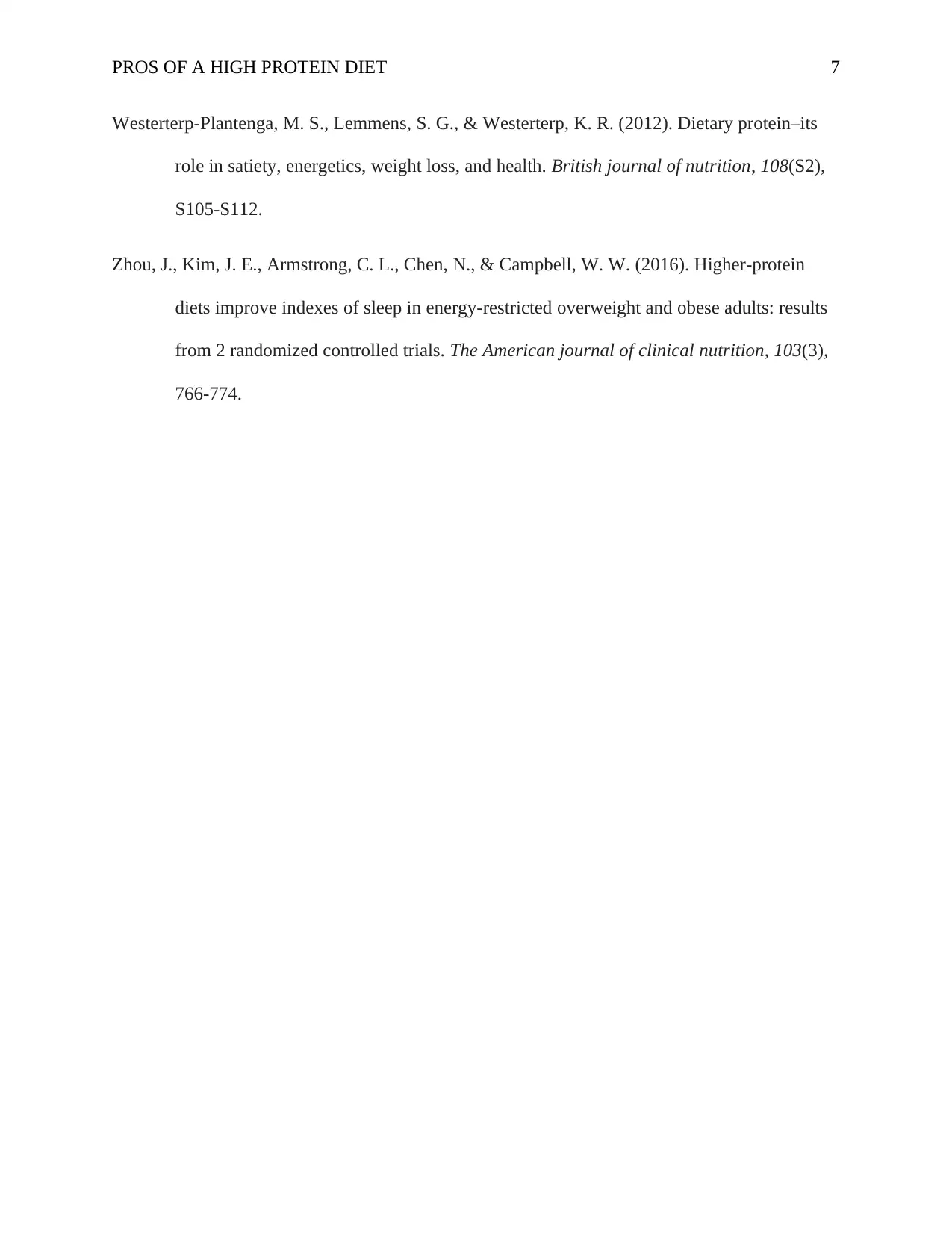
PROS OF A HIGH PROTEIN DIET 7
Westerterp-Plantenga, M. S., Lemmens, S. G., & Westerterp, K. R. (2012). Dietary protein–its
role in satiety, energetics, weight loss, and health. British journal of nutrition, 108(S2),
S105-S112.
Zhou, J., Kim, J. E., Armstrong, C. L., Chen, N., & Campbell, W. W. (2016). Higher-protein
diets improve indexes of sleep in energy-restricted overweight and obese adults: results
from 2 randomized controlled trials. The American journal of clinical nutrition, 103(3),
766-774.
Westerterp-Plantenga, M. S., Lemmens, S. G., & Westerterp, K. R. (2012). Dietary protein–its
role in satiety, energetics, weight loss, and health. British journal of nutrition, 108(S2),
S105-S112.
Zhou, J., Kim, J. E., Armstrong, C. L., Chen, N., & Campbell, W. W. (2016). Higher-protein
diets improve indexes of sleep in energy-restricted overweight and obese adults: results
from 2 randomized controlled trials. The American journal of clinical nutrition, 103(3),
766-774.
1 out of 7
Related Documents
Your All-in-One AI-Powered Toolkit for Academic Success.
+13062052269
info@desklib.com
Available 24*7 on WhatsApp / Email
![[object Object]](/_next/static/media/star-bottom.7253800d.svg)
Unlock your academic potential
Copyright © 2020–2026 A2Z Services. All Rights Reserved. Developed and managed by ZUCOL.





